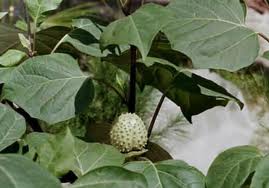| PlantID | 0070 |
| Botanical Name | Datura metel |
| Common Name | Sada dhatura |
| Classification | | Kingdom: | Plantae | | Subkingdom: | Tracheobionta | | Division: | Magnoliophyta | | Class: | Spermatopsida | | Subclass: | Asteridae | | Order: | Solanales | | Family: | Solanaceae | | Genus: | Datura | | Species: | metel |
|
| Part used | Leaves, seeds and root. |
| Medicinal Properties | Anaesthetic, antidiarrhoeal, antipyretic, antiseptic, anodyne, antiasthmatic, antispasmodic, antitussive, hallucinogenic, hypnotic, hydriatic, narcotic.
|
| Medicinal Use | Seeds & root: used in insanity, skin diseases. It also cures ulcer, scabies, pruritus and fever. It causes vertigo. |
| Chemistry | Seeds: Scopolamine, daturadiol, daturalone, factusine, hyoscyamine; Leaves: atropine, niacin, vitamin C; root: hyosine, atropine, apophyoscine, norhyoscine, meteloidine, noratropine, tropine, pseudotropine. |
| Cultivation | NA |
| Regional Habitat | Commonly found in waste places, along road-sdies and railway lines, scrub-jungles. |
| Description | Coarse herbs, minutely pubescent. Annual growing to 1.5 m. Leaves: large, entire sinuate or toothed, base unequal. Flowers: erect, whitish-purple. Calyx: long-tubular, 5-toothed at the apex. Ovary: 2-or spuriously 4-celled. Capsule: globose or ellipsoid, nodding, spinous. Seeds: compressed, rugose, brown. Flowers and fruits during July-December, sometimes in April-June.
|
| Image |  |


